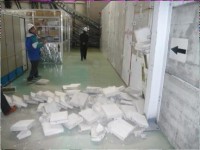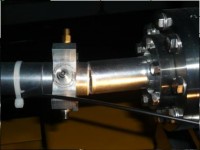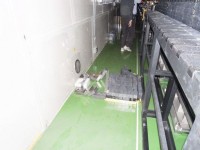As many people in the world already know, Japan is currently dealing with its worst disaster: Japan’s biggest earthquake on record and the fourth largest in history. Thousands of lives have been lost. Tens of thousands people are forced to evacuate and live without basic necessities. Hundreds of thousands are still missing.
KEK laboratory in Tsukuba is also dealing with the situation, and established an earthquake emergency response team headed by director general Atsuto Suzuki on 11 March upon the arrival of the earthquake. Because of the power outage, detailed investigations into damages have not yet been conducted. However, some damage to the buildings and facilities have already been identified based on a glance-over inspection.
“The ILC-related facilities at KEK sustained considerable damages, especially at ATF (Accelerator Test Facility), which suffered severe damages,” said Seiya Yamaguchi, head of the Linear Collider Project Office at KEK. Many cracks on the building surfaces have been observed, and some window glasses were destroyed. Some of the cables and concrete shield blocks fell down. “The ATF linear accelerator suffered considerable damages. We will need a length of time to fully recover from the incident,” said Yamaguchi.
KEK reported that the operation of all accelerators and experimental devices operations were stopped immediately after the first shake, and confirmed employees were safe from radiation and that there was no hazard to the environment. There are no reports of casualties on either the Tsukuba or Tokai campuses. All users and collaborators who stayed at the Tsukuba and Tokai campuses were confirmed safe, and those who were at the Tokai campus have either moved to the dormitory at the Tsukuba campus or have returned to their homes.
Staff at KEK have received many e-mails from colleagues all over the world concerning the circumstances of the laboratory, which include warm encouraging words such as those from Taiwan:
Japan has endured many hard time in the past and proved to the world that miracles exist. We wish the earthquake never happened. Nevertheless, facing the heartbroken tragedy today, it only makes Japan a stronger nation and united as ever.
KEK staff are endeavouring to understand the extent of the damage and how to actively address the situation. “Our first priority is to restore the facilities and reopen the lab. We sincerely appreciate everyone’s understanding and cooperation,” said Suzuki.
Akira Yamamoto, GDE project manager, also expressed his hope for the future of KEK. “We are deeply thankful for the many e-mails and warm words we have received from many global collaborators around the world,” he said. “We have been much encouraged and have received the energy needed to overcome this very difficult situation. We seek all possibilities for moving forward. We would hope to continue and extend our global team effort for the ILC.”
Further reporting will appear in a future issue of ILC NewsLine.




Recent Comments